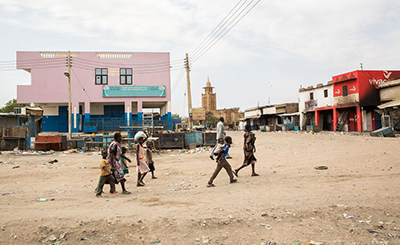“This is the worst situation I ever reported since I started reporting in 2007,” BBC Media Action producer Manyang David Mayar told me after he left the restive town of Bor, Jonglei State in South Sudan. Forced to walk long distances carrying his suitcase on his head to escape the fighting in Bor, Mayar drank dirty water and slept in the bush.
In mid December, fighting broke out between forces loyal to President Salva Kiir and those supporting the former vice-president, Riek Machar. Since then, the conflict over political control has reignited long-standing ethnic tensions, and contested towns such as Bor, Bentiu, and Malakal have become desolate shells of their former selves. The government has recently retaken all three towns and signed a ceasefire agreement with the rebels on Thursday, according to news reports. The United Nations says at least 10,000 have died in fighting across the country. Local officials estimate 2,500 have died in Bor alone, news reports said.
After changing control four times, the formerly bustling town is now virtually silent–as are the airwaves, according to news reports. After violence erupted along ethnic lines, most reporters were compelled to flee the two radio stations operating in Jonglei State, Mayar told me. The government radio station, Jonglei Public Radio, turned into a mouthpiece for the rebels, with the station under the control of rebel spokesman Hussein Marr Nyot. The only independent station, Radio Jonglei 95.9 FM, closed down after staff fled and the station’s equipment was looted. Other Bor-based freelancers have fled to camps for internally displaced persons and/or lost their equipment, local journalists told me.
The news outlets available in Bor are the U.N.-backed Radio Miraya and BBC World Service, which provide a national view but little “information people in hideouts like me desperately want to know–details about when the armies would reach their areas of the bush,” Mayar wrote. Mayar and other local journalists told me the majority of local news houses in South Sudan self-censor or follow either the government or rebel narratives, fearing retribution by either warring party. The result is that citizens do not trust news outlets, and the rumor mill has heavy influence.
In Bor and other towns, including the capital, Juba, citizens fled unnecessarily out of the urban centers because of false news reports and rumors of imminent attacks, local journalists said. “Some of the difficulties [citizens] are facing now are not so much threats of worsening security but rumors,” Mayar told me.
The oil-rich town of Bentiu in Unity State is similar to Bor: intense fighting has reduced it to a ghost town with an information vacuum. There are only two radio stations in Unity State and the state radio is the only one functioning, freelance journalist Bonifacio Taban told me. “When I left Bentiu, so many people were killed, it was the worst situation I have come across,” he said. “The town was deserted, the markets completely burnt down.” Taban, who to my knowledge is the only full-time reporter based in the town, fled recently after receiving warnings from colleagues that the government may target him for his reporting, he said. Taban published a story on the news website Sudan Tribune alleging that a rebel group in neighboring Sudan had joined government troops fighting in Bentiu, a report the Sudan rebels denied. Taban does not know when it will be safe to return to Bentiu.
Meanwhile, Malakal in Upper Nile State was ravaged by the fighting and changed hands twice; not a single local news station is running full time, local journalists said. The BBC outlet based in Malakal ran out of fuel and ceased operating, according to news reports. Catholic Radio Network’s Malakal-based station, Sout al Mahaba, stopped operating during the conflict and cannot resume now that the fighting has dissipated due to lack of fuel and damaged equipment, Network Director Enrica Valentini told CPJ.
Signs of security have restored some hope in the local press that journalists can resume reporting. But few hold much hope for greater press freedom under the current leadership.
“There is no freedom of the press or speech in South Sudan,” said Rebecca Garang, former presidential adviser and widow of former rebel leader John Garang, in an interview with a Ugandan broadcaster, Urban TV. “If you say something against the president, you are arrested.” Authorities seized an entire print run of the independent Juba Monitor this month for two articles, one an editorial that proposed the formation of an interim government and the other a historical account of tribal tensions, news reports said. Local journalists based in Juba told me that authorities threaten them by direct confrontations and phone calls if they do not subscribe to the government’s narrative of events.
Given the immense challenges the local press face, especially in the restive towns outside the capital, it’s difficult to get an accurate picture of the situation in South Sudan. And yet, as Mayar said, South Sudan needs reliable information more than ever if hopes for peace are to be realized.
